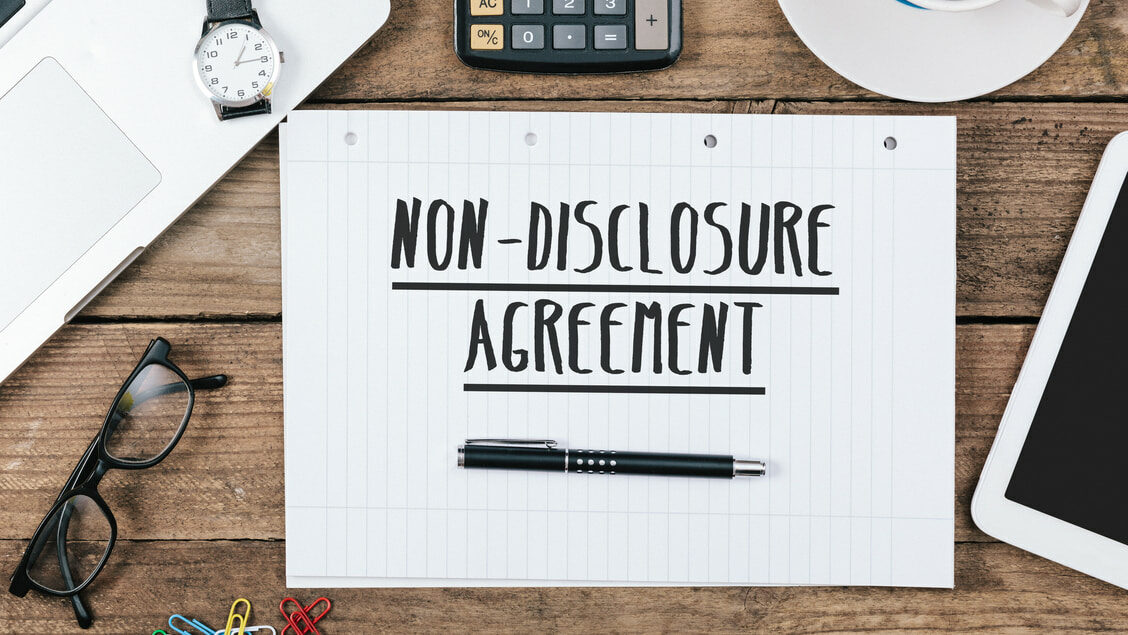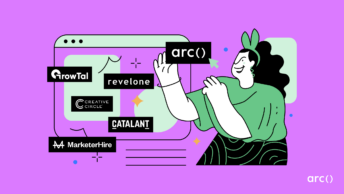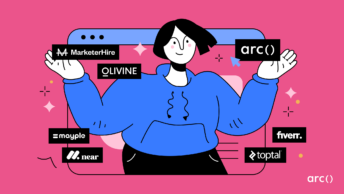Nobody wants to sign your non-disclosure agreement.
VCs, software engineers, and freelancers will all likely throw some shade your way when you bring up the NDA. But if you’re an entrepreneur, you still need to protect your confidential information in certain circumstances.
In this post, we will cover why you need an NDA, who you should expect to use one with, what should be included in an NDA, how to draft the NDA template, the proper timing for signature requests, and how to enforce a non-disclosure agreement.
Here we go.
Looking for top talent fast? See how Arc can help you:
⚡️ Find developers, designers, marketers, and more
⚡️ Freelance or full-time remote + fully vetted
⚡️ Save up to 80% with global hires
Hire top talent with Arc risk-free →
What’s an NDA?
A non-disclosure agreement is a legal document that is intended to set up a confidential relationship between two or more parties, made up of a party disclosing information and a party receiving information.
The NDA stipulates that information shared between parties should be used only for the purpose of that specific partnership, so as to protect the market position and the competitive advantage of the disclosing party.
Basically, the two parties agree to share information in order to help each other — while promising not to use that information outside of the relationship in such a way that could damage the other party’s interests.
NDAs can be written as a section of an employment contract or separately drawn up. A non-disclosure agreement can also be referred to as: a Confidentiality Agreement, a Confidential Disclosure Agreement, a Proprietary Information Agreement, a Secrecy Agreement, a Proprietary Information and Inventions Agreement, or for that matter, any other arrangement of words indicating confidentiality that a disclosing party might prefer.
Read More: How to Do Taxes When Hiring a Freelancer (Software Developer Clients)
Why Do You Need a Non-Disclosure Agreement?
If you are building a business, presumably there is certain information you wouldn’t want getting into the hands of potential competitors. Here are some of the main assets businesses seek to protect through a non-disclosure agreement.
Intellectual Property
Because of the incremental but speedy nature of software development, Intellectual Property Rights (IPR) patents are quickly becoming irrelevant in the industry. Most developers working on new projects are free to use code from open source libraries like ReactJS or AngularJS, which means the wheel is hardly ever reinvented for new software.
In most cases, it would be counterproductive to file a patent for code that would be outdated by the time said patent was delivered. Instead, companies can protect their software innovation by including a work-for-hire clause that requires that the rights to the code and products developed by employees and freelancers are automatically transferred to the company.
This can be included as a clause within the NDA, or for those who are really concerned their pot of gold will be pilfered, a separate Intellectual Property Rights Agreement can be used. However, this may feel excessive to some and can be taken as an insult to one’s professional integrity.
In fact, legal experts suggest that common law will usually be enough to uphold an employer’s rights to all of the creative works developed by employees in their service. However, this is not true of independent contractors, who will retain rights to their work unless otherwise agreed upon.
Therefore, entrepreneurs should take care to include a work-for-hire or transfer of rights clause in an NDA or contract when working with freelancers.
Proprietary Information and Trade Secrets
There is a slight distinction between proprietary information and trade secrets, and a business may reasonably want to protect both. Proprietary information is any unique information that a business uses to operate, including:
- Suppliers
- Manufacturing agreements
- Marketing strategy
- Development processes
- Pricing
- Customer lists/client info
- Research & data
- Formulas and algorithms
- Unique code
- Test results
- Product development plans
The list goes on. Not all proprietary information is or needs to be confidential. The business must decide what proprietary information they want to mark as confidential, thereby making it a trade secret. The Uniform Trade Secrets Act (UTSA) defines a trade secret as:
(i) information that derives independent economic value, actual or potential, from not being generally known to, and not being readily ascertainable by proper means by, other persons who can obtain economic value from its disclosure or use, and (ii) is the subject of efforts that are reasonable under the circumstances to maintain its secrecy.
Basically, this is your “secret sauce.” Information that helps you make a profit and is not readily available to others — the stuff that you wouldn’t want your competitors to have.
The most important reason for using an NDA is to guard against future legal expenses. You can hopefully avoid future litigation by protecting your trade secrets and insisting on ownership of the intellectual property developed at your business.
The Non-Disclosure Agreement should be designed to provide a measure of protection against having to sue someone who has improperly used your information and, likewise, averts the risk of being sued for rights or royalties by a former employee or freelancer who wants to claim rights to products they helped develop.
Read More: Good Developers Don’t Always Make Good *Freelance* Developers
What Should Be Included in an NDA?
This section will go over the eight clauses that define an NDA, two of which are optional and should be carefully considered if written in.
- Definition and Scope
- Non-Use
- Non-Compete
- Representative Provision
- Duration
- Return Clause
- Arbitration Clause
- Attorney Provision Fee
1. Definition and Scope
The definition and scope of what will be considered confidential are the most important parts of the NDA. It’s best to be specific when designating what proprietary information will be a trade secret.
Without further clarification, terms like “proprietary information” or “business practices” are vague, and will likely not be enforceable if put to a legal test. Plus, under such broad terms, all information exchanged could be considered confidential. In a one-way NDA, the receiving party would be wise to walk away.
Whether it be your codebase, algorithms, client lists, product roadmap, or any other valuable proprietary information, it should be specified as confidential in the NDA. Future communications or documentation including these confidential items should also be marked as such with a “confidential footer.”
2. Non-Use
As we’ve mentioned in an earlier section of this article, the whole purpose of an NDA is to formally agree that the information exchanged is only to be used by the parties entering into a partnership. Therefore, your NDA will need to have a non-use clause.
In addition to agreeing not to disclose your confidential information, the non-use clause also prohibits the receiving party from making use of the information in such a way that would be damaging to the vital business interests of the disclosing party.
The non-use clause is intended to prevent:
- Formation of new businesses in direct competition to the disclosing party
- Receiving parties from using confidential proprietary information as a bargaining chip for personal gain or new job opportunities
- Existing competitors from soliciting current employees or freelancers for the knowledge they have of your business secrets
The non-use clause should not prevent:
- The receiving party from using new skills learned in the future
- The receiving party from working on projects with similar but technically different applications in the future
🌟 To make the non-use clause more acceptable to the receiving party, consider making the restriction only as long as the duration of the project or employment contract.
Read More: Toptal vs Upwork, Fiverr, Arc: Where to Find Great Freelance Developers?
3. Non-Compete
The jury is out on whether or not it’s appropriate to use a non-compete clause in your non-disclosure agreement. Any developer worth their salt is probably not going to sign anything that restricts their future employment options.
Freelancers will be especially sensitive to any non-compete language. If you must have a non-compete clause, it should only be designed to prevent the employee or freelance developer from taking your technology and business model to a direct competitor or soliciting your employees to start a competing business venture. It typically should not prevent them from working in the same industry or location, for any period of time.
In truth, both of these objectives can be achieved with the non-use clause. Another reason to tread lightly when it comes to a non-compete is that many state courts deem non-compete restrictions a barrier to free trade and seldom enforce this part of an NDA anyway.
4. Representative Provision
To provide your partners with more flexibility and freedom to complete the project as they see fit, you should consider including a representative provision. The representative provision permits confidential information to be shared with associates of the receiving party for the purpose of completing the project. Once information is shared with a representative, he or she will be bound by the terms of the NDA as well.
This clause should define who may be considered a “representative,” and can also require that the recipient party inform the disclosing party of any additional associates who will be collaborating on the project.
5. Duration
When drawing up an NDA, you will want to define a reasonable length of time for the agreement to remain in force.
Too short, and you expose yourself to the risk of competitors learning your trade secrets before you’re able to establish a firm competitive edge. Too long, and skilled developers will not want to work with you.
Most experts suggest anywhere from two to five years as a fair term of obligation, after which the agreement will automatically terminate.
Read More: Hiring Developers Online: Freelance vs Recruitment Agencies vs In-House
6. Return Clause
Throughout the course of a project, you will have likely transferred a lot of files, instructions, data, communications, and other materials containing your business’s confidential information.
Upon termination or completion of the project, you will want the return or destruction of the most sensitive of those documents. This clause stipulates that upon the written request of the disclosing party, the recipient of confidential information returns or destroys the material in their possession.
Just like confidential information should be specifically defined, what must be returned or destroyed should also be specified. Unless you are a government defense contractor, it won’t be necessary to ask someone to delete every single email or file they have received from you — just protect the key ingredients of your secret sauce!
7. Arbitration Clause
Should things go awry, having a mutual understanding of how to handle a dispute can save you money and hassle. Lawyering up and going to court to file a lawsuit is very, very expensive. This should be considered a last resort. The arbitration clause in your NDA is the place to outline alternatives to official litigation.
Your preferred path should be good faith mediation between parties. This is essentially a discussion facilitated by a moderator to air grievances and explore solutions. If informal mediation fails to resolve differences, you can opt for a binding (or non-binding) arbitration committee. This is like a mini-trial outside of the official judicial system.
Arbitration committees can deliver decisions, which are typically a good indicator of how an actual court proceeding would go. Your last and most resource-draining option is to bring your dispute to trial.
Lastly, your non-disclosure agreement’s arbitration clause should identify the territory whose laws will be used to govern the agreement, including any disputes.
8. Attorney Provision Fee
An attorney provision fee requires that the “losing” party of a lawsuit pay the legal fees of the prevailing party. Of course, this will help to ease the burden of litigation, but it also conflicts with mediation and arbitration for that reason.
When passions are inflamed and both sides believe they are in the right, removing the threat of financial punishment will mean that parties are less likely to cooperate. With that in mind, you may choose to include or not include an attorney provision fee in your NDA.
Read More: 14 Toptal Alternatives to Hire Freelance Software Developers & More
You can also try Arc, your shortcut to the world’s best remote talent:
⚡️ Access 450,000 top developers, designers, and marketers
⚡️ Vetted and ready to interview
⚡️ Freelance or full-time
Try Arc and hire top talent now →
What’s Not in an NDA?
Public knowledge. As mentioned earlier in this article, most software applications today are developed using snippets of open source code. If the codebase used to develop your project is publically available, it cannot be included as part of your confidential information.
That being said, new changes made to source code may become part of your business advantage and can be protected under the NDA.
Prior knowledge and independently developed knowledge. Rights to knowledge or innovations credited to the freelancer prior to the partnership will be retained by the freelancer developer. The same goes for knowledge developed independently of the project, even if it occurred during the time of the partnership.
Freelancers would be wise to make an itemized list of any valuable knowledge or previous inventions to be covered under this clause.
Third-Party Information. Freelance software developers often work with various clients, and they may have more than one non-disclosure agreement in force concurrently. The NDA should specifically note that information obtained by a third party is not confidential.
This protects the freelancer from being unfairly sued for breach of contract in the case that information disclosed from various parties overlaps.
Entrepreneurs vs. Freelancers vs. VCs
When it comes to signing NDAs, there’s no doubt that there are diverging interests between entrepreneurs, potential investors, contractors, and freelancers. Entrepreneurs want to attract investment and good talent on a budget while protecting their ideas and future business success.
Venture capitalists (VCs) want to select promising business opportunities to add to their portfolios, but not forego the opportunity for other investments. Freelance developers want interesting projects to grow their skills, but they also want respect and future work opportunities.
VCs will not sign a non-disclosure agreement and entrepreneurs who insist on it will likely miss the opportunity for funding. Venture capitalists make a business out of hearing pitches and growing their portfolios. In initial pitch meetings, you need not reveal your “secret sauce.” VCs will be more interested in hearing about the value your idea will bring to consumers and your go-to-market strategy.
Reputable investors and VCs are not interested in stealing your idea for themselves. In his article Why VCs Don’t Sign NDAs and You Shouldn’t Worry About It, John Rampton points out “Investors are interested in the team building the product, and that’s what’s typically more important than the idea itself.”
If VCs agree to fund you, they’re unlikely to disclose your valuable proprietary information because that may hurt the return on their investment. However, for the same reason, they will likely expect you to protect your confidential information when contracting with third parties and freelancers.

Freelancer developers want steady work and respect. For many freelance developers, excessive NDA demands can be off-putting and can threaten their future earning potential as software engineers. In a popular blog post Why I won’t sign your NDA, a freelance programmer lists several reasons why he doesn’t sign NDAs:
- There is nothing new under the sun
- Confidentiality will not protect your business from the inevitable competition
- Your NDA treads heavily upon my right to work
In concluding the post, the programmer asserts:
It’s because the ideas you are likely to share with me over coffee or in a phone conversation are otherwise plentiful, worthless in isolation, and, to some degree, completely unoriginal and already known to the world.
Other freelance developer communities reveal similar sentiments towards NDAs. Here’s what programmers are saying on the /r/webdev subreddit about NDAs.
❖ Ideas are a dime a dozen; the execution is what counts. If their idea is so simple that anyone can do it just from hearing about it, it’s not worth pursuing as a business.
❖ An NDA is just an opportunity to make myself potentially liable in the very likely case that two different clients have some overlap in their business ideas.
❖ It’s all upside for you, as it imposes no new restrictions at all. It’s all downside for me as it doesn’t guarantee me a contract, any money, or a higher caliber of client. All it does is heighten the likelihood of being randomly sued.
❖ It’s a red flag that the client has trust issues, an inflated sense of the importance of their ideas, and takes an adversarial stance to the relationship.
❖ I don’t want to legally bind myself to their idea, plus, who knows, it may hinder my ability to do work for somebody with a similar idea in the future.
While freelance developers are rightly sensitive to the terms and restrictions of NDAs, most understand it’s part of the industry and will be okay with fair non-disclosure terms. In Why I Won’t Sign Your NDA, the author concedes that there are times when an NDA is appropriate.
So what are those times?
According to the blog post, “when there is something significant and tangible to disclose. Something you can point to and say ‘There, THAT’S what is confidential.’”
As mentioned in an earlier section of this post, it will be beneficial for both parties to specifically define what trade secrets are confidential.
Read More: Freelance Payment Terms: Fixed Cost vs Hourly vs Retainer Payments
When to Request Signatures
At the point of partnership. This is pretty straightforward and should be agreeable to all parties. Once you find a freelance developer and agree to work together, it’s fair to ask them to sign a non-disclosure agreement.
Unless you are discussing confidential parts of your project already, don’t ask freelancers to sign your NDA at initial meetings or interviews. This is not a good way to start off the partnership and may be taken as a sign of mistrust. Besides, you don’t really need to share anything confidential when you are interviewing.
As a rule of thumb, once you start sharing confidential information, you can take out your NDA. Remember, ideas alone aren’t valuable. Value comes from the successful execution of your idea. Your most important confidential information will be created and shared during idea execution, not idea discussion.
Deed of Assignment
A Deed of Assignment can be used if you have a “whoops, I messed up my NDA” moment, or if you forgot the NDA entirely. A Deed of Assignment stipulates that rights to intellectual property and innovations previously created by contractors will automatically be transferred to the employer.
You can find a template Deed of Assignment for free through a simple google search. While a potential lifesaver if you don’t have an existing work-for-hire clause, a Deed of Assignment after the fact is not ideal. Once the terms of the partnership have been set, freelancers will be under no obligation to agree to additional contracts.
When Do I Need a Lawyer?
Most likely, if you are trying to get your business off the ground, you have already retained a lawyer. Experts recommend consulting a lawyer to draft, or at least review, your NDA to make sure you are properly protecting your proprietary information.
Experienced entrepreneurs also suggest taking ownership of legal necessities like your NDA. Only by being involved in drafting your NDA can you be fully aware of how it will be applied and affect your business and your partners. To this end, you may find it useful to reference or adapt a non-disclosure agreement template to best suit your own confidential relationships.
(The last section of this article provides links to NDA Templates.)
The other time you may need a lawyer is in the case of breach of the NDA contract when disputes cannot be resolved via mediation or arbitration.
Read More: What a Freelance Developer Contract Should Include (w/ Templates)
How Do You Enforce an NDA?
As we have stressed, your first options for settling disputes should be mediation or arbitration. That’s because litigation is costly, time-consuming, and often ineffective. The cold hard truth is that most NDAs do not hold up in court.
Non-disclosure agreements are most effective in establishing a paper trail of confidential information as it relates to partnerships, and discouraging partners from misappropriating proprietary information.
If you do intend to bring forth a suit for breach of your Non-Disclosure Agreement, this site offers some legal advice, which we summarize below.
1. Hire a lawyer to help you analyze your chances of winning a legal dispute and choose which claims to sue for. Possible claims include:
- Misappropriation of Trade Secrets
- Copyright Infringement
- Conversion (theft of property)
- Patent Infringement
2. Gather evidence of how trade secrets were lost, how they were used, by whom they were used, and the economic value of that confidential information.
3. Determine the stage of the breach and react accordingly.
According to Pooley and Westman’s Trade Secrets, misappropriation of confidential information may be at one of three stages: threatened, continuing, or completed.
A threatened misappropriation is when information has been taken or is at risk but has not yet been used or revealed to the public. A continuing misappropriation is when information has been lost or used, but not yet revealed to the public. Completed misappropriation is when information has been used or released to the public — damage is irreversible and complete.
4. Decide the desired solution, file your claim, and submit supporting documentation. In the case of threatened information, the dispute can often be resolved through goodwill mediation or arbitration. If not, you can request an injunction or an emergency injunction. An injunction is a court order for a party to take or refrain from taking some action that would infringe upon the legal right of the other party. If an injunction is held up, the breaching party will have to return all sensitive information.
If misappropriation is ongoing, you may request an injunction, as well as sue for damages. Damages are profits you have lost due to misappropriation or the profits unfairly gained by competitors.
If misappropriation is complete, you can sue for damages and/or royalties. Royalty payments would be negotiated as an ongoing compensation for use of the trade secret.
Lawsuits can take months, or years, to settle — all the while legal expenses will only continue to grow. In determining whether or not you want to resolve a dispute via litigation, you should carefully consider the value of the information you are trying to protect, relative to the cost of protecting it!
Read More: 21+ Important Freelance Interview Questions to Ask Software Engineers
NDA Templates
Non-disclosure agreement templates, customizable confidentiality documents, and business consulting services can easily be found by doing a simple Google search, whether you need an NDA template for app development or require a completely customized NDA to ask a freelancer to sign before a long-term engagement.
General NDA Templates
There are many sample templates available online, but most of them are pricey. Here is a free, well-structured non-disclosure agreement template designed to suit various business needs while saving time and costs.
By using a template to help draft your non-disclosure agreement, you can build your knowledge of best confidentiality practices while customizing it for your specific business interests. You can also cut down on the hourly fee paid to an attorney by bringing them a ready-made document that only needs to be reviewed and revised.
Customizable NDAs/ Consultant Services
If you need something stronger than a basic NDA template available online for free, you may need a customizable NDA template or the services of a professional.
Here are some other resources you can utilize to craft a non-disclosure agreement that suits your use case, which can be customized to your needs and concerns:
Conclusion
Many entrepreneurs and startup founders think they have to develop their product in guarded secrecy and lock up all of their proprietary information like everything is CLASSIFIED.
The truth is that expending too much time and money creating legal safeguards for your business, in most cases, isn’t worth it, and can scare away potential investors or talent.
That being said, adopting an NDA with an attorney review is an advisable and cost-effective way of protecting your business advantage. Taking this basic step will provide a measure of legal protection and need not detract from the product development and execution that will really make your business a success.
Read More: Andela vs Toptal vs Turing vs Arc: Which is the Best Andela Alternative?
Disclaimer: We are not lawyers, we are researchers. We have researched the most useful and relevant information on Non-Disclosure Agreements in this post and summarized it here. As mentioned in this article, it is strongly recommended that you consult an attorney when drafting an NDA.
You can also try Arc, your shortcut to the world’s best remote talent:
⚡️ Access 450,000 top developers, designers, and marketers
⚡️ Vetted and ready to interview
⚡️ Freelance or full-time








